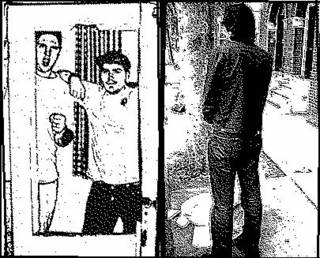If a trauma may reduce a man to a childish state, then a conflict with an overwhelmingly hellish set of possibilities may well reduce a society to similar natal state. When the weight of history falls upon any generation, that generation may feel itself curling into the spiritual and mental equivalent of a fetal position. The great empires and wars of the past have resurfaced in the form of a world conflict that shakes the collective rationale to its philosophical roots.
The very notion of nationalism, which saw the human race through the great wars of last century, is the first ideal to feel its metaphysical grasp attacked. After all, the enemies know no border, nor do the soldiers, nor the defenders. The State is proving to be a very subjective institution indeed, bogged down by the quagmire that relativism is. One's home may reside in the state, and an emotional impulse to defend it is natural, and understandable, but the relation between the state and the home is not as clear as it was in 1942. Here is only part of the dilemma for the people of the world: if my home is not safe in the hands of the State, and it is not safe in the hands of the attackers, then with whom does the security of my home reside?
The facade of rationalism that has been applied to life for a century or more is crumbling. History reminds us of another generation, too young to fight the fascists in Europe, but old enough to recognize the minuscule value of their own lives under the shadow of nuclear war. Civilians are again the fodder for the conflict of the quasi-State. Westerners are the causalities of hijackings and biological warfare, while the poor and hungry of the third world will fall to the blunt instruments of the superpowers. Security is temporarily being defined as living life as we may have in the not too distant past, but as Fall and fighter jets swarm the mid-Atlantic, life is again at a standstill, as it was after the Korean war for many individuals; precarious at best.
Attempts to rationalize the surreal and inexplicable situation of the world popularly hinge on deducing a cause. Unfortunately, theories of the haves and the have-nots, the Imperialists and the agrarians, the East and the West, the religious and the secular, all fail to synthesize what is ultimately 2,500 years in the making. From the Roman Empire and the conditions from which the Abrahamatic religions took root, to the colonization by European countries, to the Napoleanic conquests which shaped the lines of battle for the first world wars, to the Cold War and the post-colonial ramifications, placing blame is hardly a viable issue. Still, the fact is plain; homes are threatened, and they must be defended. Why they must be defended is not a question that can be rationalized; to do so would be to forfeit that uncomfortable feeling which all of humanity must internalize: our lives are not in our control. Worse still, our lives are the only thing that we have left.
If the die is cast, if we are grass shoots in the path of history's sickle, and if we, as members of a community which only providence has chosen for us, are to be front line combatants, then which side do we want to be on? How disconcerting to be placed in the position of even having to ask that question. It is clear, however, that no person's perception is worthy of our complete trust. It would be clear if this conflict was simply about retribution for a damaged skyline, but no player is approaching an end-game in which those that would poison mail and transportation and a religion are removed from the global community. Who is guilty? Who are the victims? Where is the mighty justice of the civilized world? Where is the empathy for those denied education and the simple joy of music? Humanity may be dead, but the propaganda machine churns out from the caves of the East and the conference rooms of the West.
In the face of suspect motives of my enemy and my state, as well as the truly irrational and subjective nature of this antepost-modern 21st century, I choose to modernize Stephen Dedalus: "I will serve no ideology; be it economic, religious, or political." Furthermore, I must conclude that it is the war of all against all, every man for himself; the individual is the priority now. As a species, our last line of defense may be our souls, and the chaos which whips around us now is forcing us to begin again, to abandon the philosophies of the past. Watch for the root being burned away, so that you may be ready to plant again when the fire has subsided.
Editorial note: Jack discovered this buried, virtually of course, amongst several hundred files of his original work. There has been very little editing, and we are hard pressed to accurately date it. If a guess has to be taken, Springtime of 2002 will suffice. Of course, the author was significantly less able to articulate himself in those days, though Jack has allowed the flaws in language to remain. |








